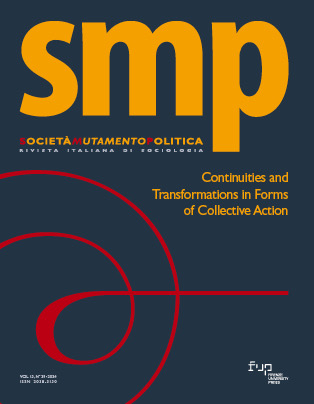Published 2024-07-23
Keywords
- care,
- social reproduction,
- feminist ethics,
- democratization
How to Cite
Copyright (c) 2024 Sara Fariello, Irene Strazzeri

This work is licensed under a Creative Commons Attribution 4.0 International License.
Abstract
“Taking care” involves a politics of relationships. Care has both a subjective and a relational dimension: starting from subjectivity, everyone opens up to vulnerability, dependence, fragility. Care is above all a practical path of spillage from the self and return to the self, enriched by the experience of the other. This paper proposes a reflection that starts from the founding myth of the essentiality of care and crosses the feminist critique of essentialism and the dialectical tension between mysticism and de-valuation. Focusing on the analysis provided by the so-called second school of ethics of care, it wants to reflect on the current possibility of making care a political paradigm for change and democratization of relationships and society.
References
- Agostinelli M. (2020), Coronavirus ed emergenza climatica, Castelvecchi, Roma.
- Arendt H. (1978), La vita della mente, Bruno Mondadori Editori, Milano.
- Aruzza C., Bhattacharya T. e Fraser N. (2019), Femminismo per il 99%, Laterza, Roma-Bari.
- Cinti D. (1996), Dizionario mitologico, Sonzogno, Milano.
- Citti F. (2012), Cura sui. Studi sul lessico filosofico di Seneca, Adolf M. Hakkert, Amsterdam.
- Delphy C. (2020), Per una teoria generale dello sfruttamento. Forme contemporanee di estorsione del lavoro, Ombre Corte, Verona.
- Delphy C. (2022), Il nemico principale. Economia politica del patriarcato, VandA edizioni, Milano.
- Di Cesare D. (2020), Virus sovrano? L’asfissia capitalistica, Bollati Boringhieri, Torino.
- Dini T. (2016), La materiale vita, Mimesis, Milano.
- Ehrenreich B. e Hochschild A. R. (2004), Donne globali. Tate, colf e badanti, Feltrinelli, Milano.
- Fariello S. e Minello A. (2023), «Dal passato al presente. Dinamiche di fecondità, interpretazioni sociali e politiche pubbliche per un paese che invecchia» in U. Pacifici Noja (a cura di), Global health, conflitti e dinamiche di genere, UniCamillus press, Tab edizioni, Roma, pp. 123-145.
- Federici S. (2018), Reincantare il mondo. Femminismo e politica dei commons, Mimesis, Milano.
- Federici S. (2020a), Calibano e la strega. Le donne, il corpo e l’accumulazione originaria, Mimesis, Milano.
- Federici S. (2020b), Il punto zero della rivoluzione. Lavoro domestico, riproduzione e lotta femminista, Ombre Corte, Verona.
- Hartley D. (2004), The ethics of welfare: Human Rights, Dependency and Responsibility, Policy press, London.
- Heidegger M. (2005 [1927]), Essere e tempo, a cura di Franco Volpi, Longanesi, Milano.
- Hochschild A. R. e Machung A. (1989), The second Shift, Viking Penguin Inc, New York.
- Illich I. (1985), Lavoro ombra, Mondadori, Milano.
- Menga F. G. (2023), Cura. Le parole della filosofia, Corriere della Sera, n.13/23, Corriere Store.
- Mies M. (1998), Patriarchy & Accumulation on a World Scale. Women in the International division of labour, Zed Books, London.
- Ortega Y Gasset, (1952), Saggi sull’amore, SugarCo, Milano.
- Pateman C. (1997 [1988]), Il contratto sessuale, Editori Riuniti, Roma.
- Re L. (2020), Democrazie vulnerabili. L’Europa dall’identità alla cura, Pancini editore, Pisa.
- Serughetti G. (2020), Democratizzare la cura / Curare la democrazia, Nottetempo, Milano.
- Strazzeri I. (2014), Post patriarcato. L’agonia di un ordine simbolico, Aracne, Roma.
- Tronto C. J. (1993 [2006]), Confini morali. Un argomento politico per l’etica della cura, a cura di A. Facchi, Diabasis, Reggio Emilia.
- Tronto C. J. (2013), Caring democracy. Markets, Equality and Justice, New York University Press, New York.
- Tronto C. J. (2015), Who cares? How to reshape a democratic politics, Cornell University Press, Ithaca.
- Zambrano M. (1996 [1950]), Verso un sapere dell’anima, a cura di Rosella Prezzo, Raffaello Cortina, Milano.

